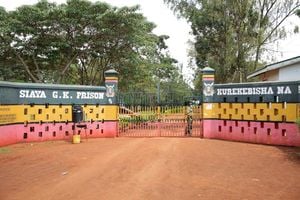Reopening of Somalia border points may be miscalculation

Interior Cabinet Secretary Kithure Kindiki on June 2, 2023. The CS recently announced that the governments of Kenya and Somalia would reopen three common border points closed several years ago.
Prof Kithure Kindiki, law scholar and Cabinet Secretary for Interior and National Administration, recently announced that the governments of Kenya and Somalia would reopen three common border points closed several years ago.
That followed a meeting in Nairobi between delegations from the two countries on cooperation in security, trade and movement of people. The 700-kilometre border was closed in 2011 by then-President Mwai Kibaki following in-country attacks by the Somalia-based Al-Shabaab. It was aimed at preventing attacks by the terrorist group, including the abduction of tourists and foreign aid workers in Kenya.
According to Nairobi, the recent decision is in line with the African Continental Free Trade Agreement (AfCFTA), aimed at promoting intra-African trade, and, therefore, a significant step towards enhancing trade and diplomatic relations between the two countries and the opening of border will lead to job creation for the local populations.
The border has been problematic since the fall of the Gen Siad Barre regime in 1991. An investigation by a leading Kenyan newspaper in 2014 revealed that Dadaab is more than a refugee camp; it’s a major smuggling hub for sugar, rice, pasta and electronics. Besides, illegal immigrants, some of whom have fraudulently acquired Kenyan IDs, smuggle more than 15,000 bags of sugar worth over Sh72 million daily from Somalia across the porous border.
The report claimed that, unlike in Garissa, where the sourcing of sugar is done by dealers in refugee camps, smuggled sugar which enters via Wajir and Mandera is procured by local Kenyan businessmen and Somali nationals, some of whom have illegally acquired Kenyan IDs. The traders have relatives in Somalia or connections through clan linkages.
On average, 50 lorries with a capacity of 500 bags, each containing 50kg bags of sugar, enter Wajir Town weekly. Some offload their cargo and others proceed to Isiolo, Marsabit and Moyale towns. Some officials who have operated in the northeastern region confide that the major beneficiaries of the contraband are local and prominent politicians, who fund both the trade and illegal groups.
Suffered terror attacks
Since 2011, Kenya has suffered several terror attacks, such as at Westgate Mall in 2013, Garissa University in April 2015 and Dusit Hotel in January 2019. The bloodiest, the Garissa one, killed 150 people. Since 2013, terrorists have slain over 300 Kenyans. Media reports trace the planning, training and logistical support for some refugee camps in the northeastern.
Counter-terrorism efforts on this border are complicated by its vast and porous nature and the terrorists’ comprehension of local politics, social and security dynamics and knowledge of the terrain. Besides, security officers are often transferred to these areas as a punishment, demoralising them.
Pundits and analysts say reopening the border points could lead to increased cross-border human traffic into Kenya; a spike in contraband trade; the possibility of entry of weapons; and more frequent terror activities. Hence the need to review the decision.
Dr Lusiola, PhD, is a security and risk consultant. [email protected].





